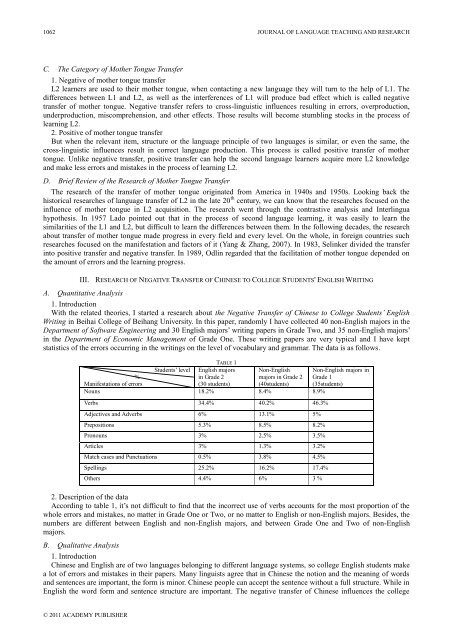Journal of Language Teaching and Research Contents - Academy ...
Journal of Language Teaching and Research Contents - Academy ...
Journal of Language Teaching and Research Contents - Academy ...
You also want an ePaper? Increase the reach of your titles
YUMPU automatically turns print PDFs into web optimized ePapers that Google loves.
1062<br />
C. The Category <strong>of</strong> Mother Tongue Transfer<br />
© 2011 ACADEMY PUBLISHER<br />
JOURNAL OF LANGUAGE TEACHING AND RESEARCH<br />
1. Negative <strong>of</strong> mother tongue transfer<br />
L2 learners are used to their mother tongue, when contacting a new language they will turn to the help <strong>of</strong> L1. The<br />
differences between L1 <strong>and</strong> L2, as well as the interferences <strong>of</strong> L1 will produce bad effect which is called negative<br />
transfer <strong>of</strong> mother tongue. Negative transfer refers to cross-linguistic influences resulting in errors, overproduction,<br />
underproduction, miscomprehension, <strong>and</strong> other effects. Those results will become stumbling stocks in the process <strong>of</strong><br />
learning L2.<br />
2. Positive <strong>of</strong> mother tongue transfer<br />
But when the relevant item, structure or the language principle <strong>of</strong> two languages is similar, or even the same, the<br />
cross-linguistic influences result in correct language production. This process is called positive transfer <strong>of</strong> mother<br />
tongue. Unlike negative transfer, positive transfer can help the second language learners acquire more L2 knowledge<br />
<strong>and</strong> make less errors <strong>and</strong> mistakes in the process <strong>of</strong> learning L2.<br />
D. Brief Review <strong>of</strong> the <strong>Research</strong> <strong>of</strong> Mother Tongue Transfer<br />
The research <strong>of</strong> the transfer <strong>of</strong> mother tongue originated from America in 1940s <strong>and</strong> 1950s. Looking back the<br />
historical researches <strong>of</strong> language transfer <strong>of</strong> L2 in the late 20 th century, we can know that the researches focused on the<br />
influence <strong>of</strong> mother tongue in L2 acquisition. The research went through the contrastive analysis <strong>and</strong> Interlingua<br />
hypothesis. In 1957 Lado pointed out that in the process <strong>of</strong> second language learning, it was easily to learn the<br />
similarities <strong>of</strong> the L1 <strong>and</strong> L2, but difficult to learn the differences between them. In the following decades, the research<br />
about transfer <strong>of</strong> mother tongue made progress in every field <strong>and</strong> every level. On the whole, in foreign countries such<br />
researches focused on the manifestation <strong>and</strong> factors <strong>of</strong> it (Yang & Zhang, 2007). In 1983, Selinker divided the transfer<br />
into positive transfer <strong>and</strong> negative transfer. In 1989, Odlin regarded that the facilitation <strong>of</strong> mother tongue depended on<br />
the amount <strong>of</strong> errors <strong>and</strong> the learning progress.<br />
III. RESEARCH OF NEGATIVE TRANSFER OF CHINESE TO COLLEGE STUDENTS' ENGLISH WRITING<br />
A. Quantitative Analysis<br />
1. Introduction<br />
With the related theories, I started a research about the Negative Transfer <strong>of</strong> Chinese to College Students’ English<br />
Writing in Beihai College <strong>of</strong> Beihang University. In this paper, r<strong>and</strong>omly I have collected 40 non-English majors in the<br />
Department <strong>of</strong> S<strong>of</strong>tware Engineering <strong>and</strong> 30 English majors‟ writing papers in Grade Two, <strong>and</strong> 35 non-English majors‟<br />
in the Department <strong>of</strong> Economic Management <strong>of</strong> Grade One. These writing papers are very typical <strong>and</strong> I have kept<br />
statistics <strong>of</strong> the errors occurring in the writings on the level <strong>of</strong> vocabulary <strong>and</strong> grammar. The data is as follows.<br />
Students‟ level<br />
TABLE 1<br />
English majors Non-English Non-English majors in<br />
%<br />
in Grade 2<br />
majors in Grade 2 Grade 1<br />
Manifestations <strong>of</strong> errors<br />
(30 students) (40students) (35students)<br />
Nouns 18.2% 8.4% 8.9%<br />
Verbs 34.4% 40.2% 46.3%<br />
Adjectives <strong>and</strong> Adverbs 6% 13.1% 5%<br />
Prepositions 5.3% 8.5% 8.2%<br />
Pronouns 3% 2.5% 3.5%<br />
Articles 3% 1.3% 3.2%<br />
Match cases <strong>and</strong> Punctuations 0.5% 3.8% 4.5%<br />
Spellings 25.2% 16.2% 17.4%<br />
Others 4.4% 6% 3 %<br />
2. Description <strong>of</strong> the data<br />
According to table 1, it‟s not difficult to find that the incorrect use <strong>of</strong> verbs accounts for the most proportion <strong>of</strong> the<br />
whole errors <strong>and</strong> mistakes, no matter in Grade One or Two, or no matter to English or non-English majors. Besides, the<br />
numbers are different between English <strong>and</strong> non-English majors, <strong>and</strong> between Grade One <strong>and</strong> Two <strong>of</strong> non-English<br />
majors.<br />
B. Qualitative Analysis<br />
1. Introduction<br />
Chinese <strong>and</strong> English are <strong>of</strong> two languages belonging to different language systems, so college English students make<br />
a lot <strong>of</strong> errors <strong>and</strong> mistakes in their papers. Many linguists agree that in Chinese the notion <strong>and</strong> the meaning <strong>of</strong> words<br />
<strong>and</strong> sentences are important, the form is minor. Chinese people can accept the sentence without a full structure. While in<br />
English the word form <strong>and</strong> sentence structure are important. The negative transfer <strong>of</strong> Chinese influences the college

















